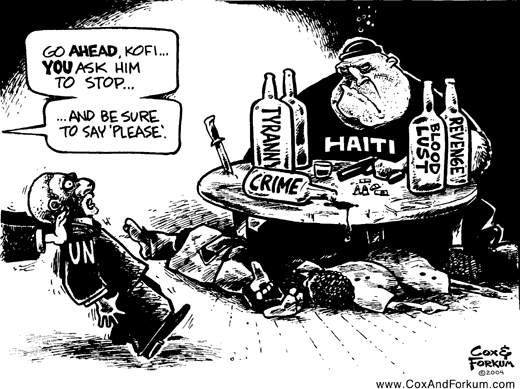Haiti
02.26.2004
My problem w/ the UN is that I finally understood it's true organizational purpose. It's not to promote human rights or democracy. The UN was created after the Second World War to preserve the status quo and balance of power. It represents the interests of states, not people. It's more concerned w/ securing state sovereingty than human rights. And it makes no moral distinction between liberal democracies & tyranical dictatorships. If you've faith in the UN to protect the rights of oppressed individuals around the world, you'll be disappointed.
Posted by Miguel at 06:57 PM
Comments
I totally agree.
I think the UN functions more as a high-profile debate society than an organization serious about giving effect to progressive initiatives.
The UN today is in an impotent position. It has neither teeth to give it real power, and it's power is limited by the amount of authority granted by it's members. (Which may have been the intended effect by its framers?) And most members zealously guard their sovereignty as protection against political offensives from other states. If the UN tried to more aggressively assert itself in defense of human rights, I think it would be quickly hammered down. Members would abandon it as having too much power over their domestic affairs. It exists as a platform for incumbent governments to declare the status quo as the only way.
I think the UN is the manifestation of a lofty ideal by a world weary of world war. And the ideal has lost impetus as the memory of that war's horrors fade into into the past.
Posted by: tom at February 28, 2004 06:06 PM
Well, Tom, the goal for which the UN was founded wasn't really all that lofty. It was established to prevent war, or to prevent wars from spreading. That's about it. It has been successful in preventing WW3 — although mutual deterrence might've done that on its own.
Another problem w/ the UN is that it is frozen power structure w/ no flexibility. The Security Council (UNSC) is the perfect example. The five permanent nations — the "winners" of WW2 (US, UK, USSR, France, China) — can defeat any resolution w/ a single "no" vote (the famous veto power).
But, in the modern world, is France still a world power? Or shouldn't the UK-French vote be combined into a single EU vote? Why isn't Japan a permanent UNSC member? Or India?
Posted by: Miguel at February 28, 2004 06:19 PM